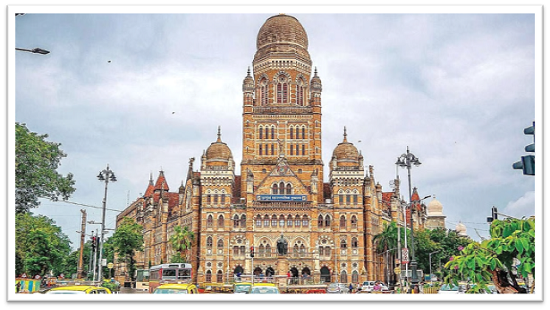
Mumbai’s Highways Get a Major Overhaul as BMC Begins ₹136-Crore Resurfacing of MSRDC Bridges on WEH and EEH
Mumbai’s two arterial corridors, the Western Express Highway (WEH) and the Eastern Express Highway (EEH), are set for a significant upgrade as the Brihanmumbai Municipal Corporation (BMC) begins major resurfacing work on Maharashtra State Road Development Corporation (MSRDC)-maintained bridges. The move follows direct instructions from Deputy Chief Minister Eknath Shinde, who intervened after months of public outrage over pothole-ridden flyovers during the monsoon. With a total allocation of nearly ₹136 crore, the civic body has initiated one of the city’s most comprehensive repair drives aimed at improving commuter safety and restoring road quality across crucial transport routes.
The BMC has earmarked ₹62.50 crore for mastic-layer resurfacing on EEH bridges and approximately ₹73.80 crore for bridges along the WEH. These two highways together carry lakhs of vehicles every day, and deteriorating bridge surfaces have repeatedly led to congestion, vehicle damage, and safety concerns. The new plan seeks to ensure long-term durability by going beyond temporary patchwork and addressing structural issues at scale.
A Response Triggered by Public Pressure
This year’s monsoon brought severe criticism for MSRDC-maintained flyovers, many of which developed deep potholes and uneven patches. Despite not being responsible for their upkeep, the BMC stepped in during the rains to fill dangerous craters, responding to growing public frustration and safety hazards. The incident highlighted gaps in coordination between agencies responsible for maintaining Mumbai’s critical road infrastructure.
To avoid a repeat of the monsoon chaos, the BMC is now taking a proactive, full-scale approach. Following a communication from MSRDC allowing the civic body to execute resurfacing work, BMC officials moved quickly to prepare tenders, inspect bridges, and design a comprehensive overhaul plan. Deputy CM Shinde’s review meeting last week accelerated the process, ensuring that resurfacing work begins well before the next monsoon begins.
Major Resurfacing Works Planned on Key Flyovers
On Thursday, the BMC officially invited tenders for resurfacing flyovers along both expressways. The planned works extend far beyond laying new asphalt. According to civic officials, the project will include crack sealing, improved lane markings, drainage repairs, and restoration of pedestrian pathways. These additions aim to address the structural issues that contribute to recurrent potholes and surface deterioration.
Extensive resurfacing is planned for several high-traffic bridges along the EEH, including Ghatkopar, Mankhurd, Vikhroli, and Thane-bound flyovers. The repairs will cover:
• Mastic asphalt resurfacing.
• Storm-water drain upgrades.
• Footpath and side-structure restoration.
• Chamber-level adjustments to improve water flow and reduce waterlogging.
These enhancements are crucial given that improper drainage has historically contributed to surface erosion on many bridges, worsening pothole formation during heavy rains.
Monsoon Patchwork Was Insufficient for Long-Term Stability
While BMC teams filled potholes during the monsoon to reduce immediate risks, officials emphasise that patching cannot guarantee durability on heavily used flyovers. The constant load of vehicles, including buses, trucks, and logistics traffic, erodes mastic asphalt quickly, creating uneven surfaces that expand into potholes within months.
For BMC-managed bridges, resurfacing is usually carried out during the defect-liability period or directly by the corporation. However, MSRDC’s lack of timely repairs created recurring safety concerns for commuters this year. “Since MSRDC hasn’t carried out resurfacing and potholes may return, the BMC will do the work on its behalf,” a senior civic official noted.
The decision ensures that commuters are not forced to endure another monsoon marked by hazardous road conditions, particularly on routes that form the backbone of Mumbai’s daily traffic.
A Crucial Step Toward Reliable Road Infrastructure
By assuming responsibility for resurfacing MSRDC’s bridges, the BMC is addressing a long-standing gap in coordination that has repeatedly compromised the quality of Mumbai’s road network. The ₹136-crore investment signals an operational shift, from reactive crisis management to planned infrastructure maintenance designed for longevity.
The resurfacing initiative is expected to improve ride quality, reduce vehicular wear and tear, and enhance safety across key corridors that connect northern suburbs with city centres. Better drainage, refined lane markings, and restored pedestrian pathways will further enhance usability for all road users.
As Mumbai continues to expand and traffic volumes climb, maintaining structurally sound transport corridors is not optional; it is foundational to urban mobility. The BMC’s timely intervention, backed by strong political direction and financial allocation, marks a significant step toward more resilient road infrastructure.
In the months ahead, as tenders are awarded and resurfacing progresses, commuters may finally begin to experience smoother, safer travel on the expressways that define daily life in the city.




